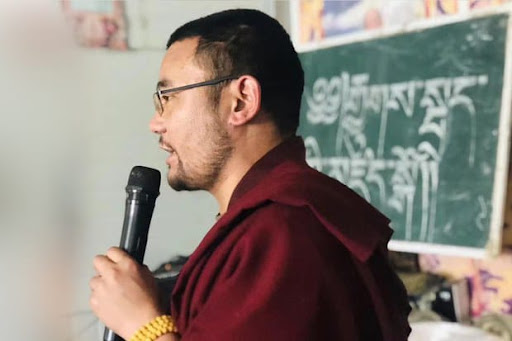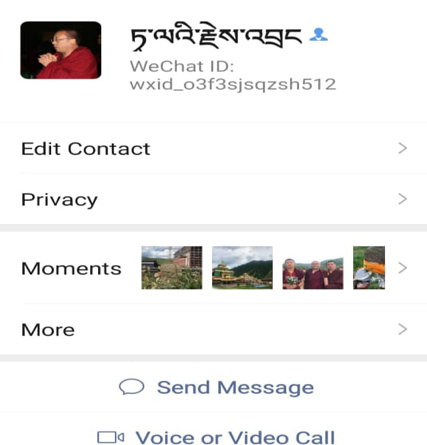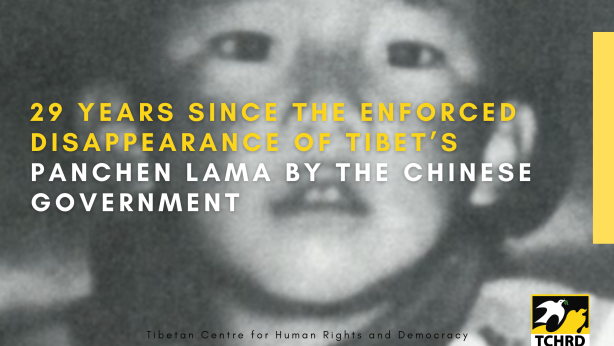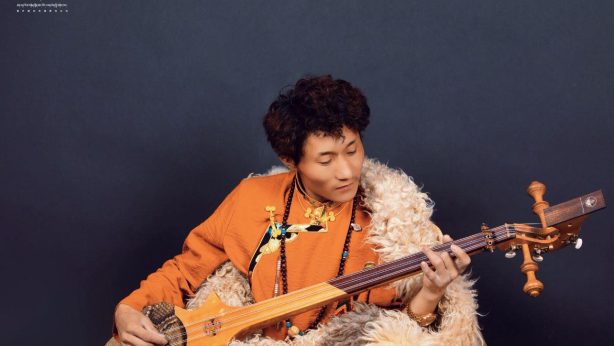Two monks sentenced to prison for challenging Chinese government propaganda

Source: Tenzin Dhargay’s personal WeChat account
The Tibetan Centre for Human Rights and Democracy (TCHRD) strongly condemns the sentencing of two monks, Tenzin Dhargay and Rigtse, to prison for merely exercising the right to freedom of expression, a right protected in the Chinese Constitution as well as in major international human rights instruments that the government of People’s Republic of China is party to.
Dhargay and Rigtse are from Bharong Village in Sershul (Ch: Shiqu) County, Kardze (Ch: Ganzi) Tibetan Autonomous Prefecture, Sichuan Province, in the traditional Dzachuka area in Kham province. Dhargay is a monk from the Dza Sershul Monastery.
Both monks had been detained incommunicado for almost two years and sentenced on an unknown date in June this year.
The Sershul County People’s Court sentenced Tenzin Dhargay to three years and six months while Rigtse was sentenced to three years in prison.
So far, Chinese authorities have handled both the cases with extreme secrecy and family members have not been provided with the details of the cases. Chinese authorities have issued stern warnings that anyone caught sharing information about the monks’ detention will have his or her social security and other state benefits canceled. It still remains unknown where the monks are imprisoned although it has been confirmed that they had been taken to another location after their sentencing in Sershul County.
Exile Tibetan sources reported on Dhargay’s detention in September 2020 after he was found keeping a photo of His Holiness the Dalai Lama and other information about the Tibetan political situation on his phone. At the time, another monk was detained along with him but his identity could not be confirmed. It has now emerged that the other monk’s name is Rigtse. Both Dhargay and Rigtse had been sentenced on the same date.
More information about Rigtse cannot be immediately obtained due to prevailing restrictions. Sources with contacts with local Tibetans informed TCHRD that Dhargay usually held great concerns about the dire situation in Tibet and used to share information and photos about the same on his personal WeChat account. Using “Dalai’s Follower” as his account name, he also used to share photos and teachings of His Holiness. Last year when China held the so-called 70th anniversary celebration of Tibet’s peaceful liberation, Dhargay had challenged the Chinese government narrative on Tibet’s occupation by saying that no such liberation happened in Tibet.

Because Bharong Village is close to Sershul County town, local Tibetans in this village are exposed to frequent Chinese propaganda and political education campaigns. A great number of the village inhabitants including the monastics, lay and youth have a long history of staging various forms of resistance against such pressures and intimidation tactics to conform to Chinese rule and policy.
TCHRD calls on the Chinese authorities to overturn this unfair and unjust verdict against Tenzin Dhargay and Rigtse and release them immediately and unconditionally. This verdict, like many others in the past, is the result of sham trials where no human rights and rule of law was guaranteed or respected. As a party to major international human rights instruments, the PRC government has obligations to promote and protect the free exercise of the right to freedom of opinion and expression. Such obligations require that the governments do not impose restrictions on “discussions on government policies and political debate; reporting on human rights, government activities and corruption; engaging in election campaigns, peaceful demonstrations or political activities; and expression of opinion and dissent, religion or belief, including by persons belonging to minorities or vulnerable groups.” In particular, the right to freedom of opinion is absolute and cannot be restricted under any circumstances. Although Article 35 of the Chinese Constitution provides that “[c]itizens of the People’s Republic of China enjoy freedom of speech, of the press, of assembly, of association, of procession and of demonstration,” this constitutional provision is still a privilege accessible to a chosen few, and not a right.


